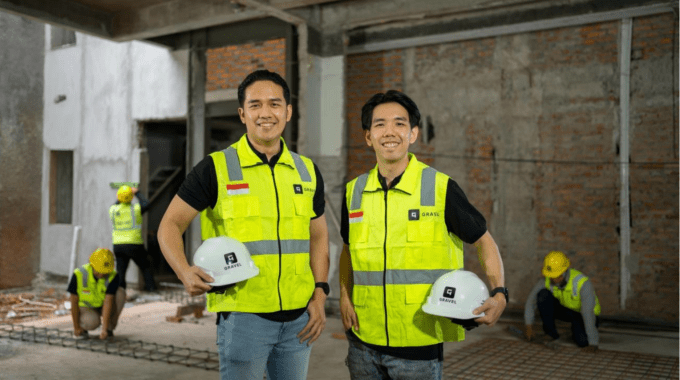Gravel gets funding from NEA to support Indonesia’s booming construction industry
Indonesia’s construction industry is growing quickly, driven by residential and industrial building, alongside infrastructure development plans by the government. Sourcing skilled labor is still a time-intensive process, however, and often relies on personal networks and lengthy recruitment efforts. The founders of Gravel want to change that by making it easier to find workers and other construction professionals. The Jakarta-based startup announced today it has raised $14 million.
Investors include New Enterprise Associate (NEA), Marvell Technology Group co-founder Weili Tai, Cadence Design System executive chairman Lip-Bu Tan, SMDV, East Ventures and other strategic investors. Gravel is NEA’s first investment in Southeast Asia. While Gravel is currently focused on Indonesia, it plans to enter international markets and will use its funding on business expansion.
Gravel started in 2019 as an app to connect users with construction workers. The platform now has four main features—Gravel Construction for hiring daily construction workers, Gravel Borongan for construction with lump sum contracts, Gravel Maintenance for on-demand home repairs and Gravel Material for ordering tools and materials.
Gravel says it saw 45x revenue growth between 2020 and 2022, and now has 1.7 million workers on the platform. It has been used for 6,000 projects in 20 Indonesian provinces, ranging from residential construction to larger ones like LRT Jabadebek (Greater Jakarta Light Rail Transit), Jakarta International Stadium, Pelni Hospital and the Keong Man IMAX Theatre.
The startup’s co-founders are chairman Nicholas Sutardja and co-CEOs Georgi Ferdwindra Putra and Fredy Yanto. Before launching Gravel, Putra graduated from U.C. Berkeley with a civil and environmental engineering masters and spent time working in the construction industry, where he saw challenges with finding labor.

Gravel co-founders and CEOs Georgi Ferdwindra Putra and Fredy Yanto
“There were numerous occasions of demand and supply inefficiencies in a large construction project where hundreds of workers were sitting idle getting paid while the project was on short pause and other occasions where additional workers were urgently needed but it took weeks to gather them,” he said. Sometimes workers were sent back to their villages to recruit hundreds of additional workers in a time-consuming process. Seeking a solution to the problem, Putra and Yanto began working on Gravel with their own funds in 2017, before launching it in 2019 after securing funding.
Skilled labors are often sourced through personal networks or by recruiting large groups of people from the same village who usually work as farmers or fishermen, but are hired for short-term projects. On Gravel, users are matched with service providers through Gravel’s Personalized Job Feed, which the startup says reduces time spent finding the right people from about two weeks to minutes.
Before starting on Gravel, workers need to have prior experience. They also go through screening in the form of online tests and skill assessments, and periodic training and development sessions.
Daily construction workers are paid within 24 hours after finishing a project through Gravel’s payment system. Putra says quick payment helps workers’ financial resilience, in turn improving their performance at work. He adds that other benefits of using Gravel for workers include access to continuous job opportunities, workshops and certificate training, a loyalty and bonus program and health and well-being support. For service providers, meanwhile, Gravel can increase their visibility to clients, attract a wider scope of projects and work packages, give them access to partners and services in their supply and demand chains and more efficient matching to potential clients.
Gravel also includes real-time analysis of project activities that gives an overview into a project’s current stage of construction, how many workers it needs and what kinds of materials and equipment are required. This helps with client budget calculations and decision making. Future plans include a predictive model for monitoring construction progress.
In a statement, NEA partner and head of Asia Carmen Chang said, “Gravel is our first Southeast Asia investment and we’re excited about the company’s potential to elevate Indonesia’s construction industry through technology.”


